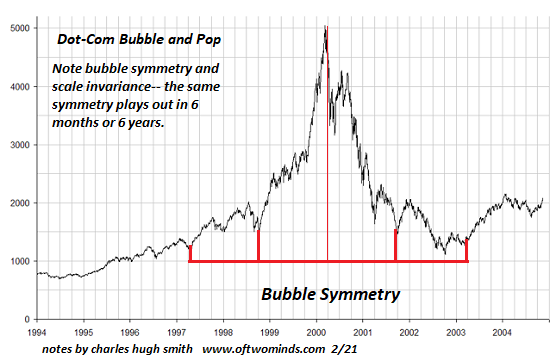The Problem With Money is that it’s complicated.
To many minds, the solution to our core economic problems is to return to sound money via either the gold standard, in which gold backs all currency, or by substituting bitcoin for gold, i.e. Bitcoin becomes the coin of the realm.
I have often held that if we don’t change the way money is created and distributed, we’ve changed nothing.
But money is complicated, and this introduces the koan of this post’s title: The Problem With Money Isn’t Money. The human mind prefers simplicity over complexity, and so we tend to seek simple solutions to complex problems. Sometimes simple solutions do work with almost magical efficacy, but other times they generate new problems that we didn’t foresee, problems that complicate our simple solution.
As David Graeber explained in his book Debt: The First 5,000 Years, the problem with money isn’t what’s declared the coin of the realm, it’s all the forms of money that aren’t coins and currency, i.e. credit a.k.a. debt, which as Graeber documents, has been "money" since commerce began.
If we cut to the chase, the problem with money boils down to:
1. There isn’t enough coin of the realm to grease all the activity everyone wants to pursue.
2. Most of the coin of the realm is owned by the wealthy, out of reach of commoners trying to improve their standard of living.
3. Regardless of what’s declared the coin of the realm, human Wetware1.0 will generate disastrously destructive speculative bubbles and panics.
If you declare clam shells as money, clam shells will be "invested" (i.e. gambled) in speculations that amass fortunes for a few and ruin for the rest. The extraordinary speculative manias and resulting ruin of the South Seas and Tulip Bubbles occurred in sound money economies. sound money didn’t inhibit the rise of bubbles and the resulting crashes, nor did it limit the depressions and panics that characterized the 19th century.
The problem in 1800 America was straightforward: there wasn’t enough gold and silver in circulation to fuel the immense drive to increase production and commerce. If sound money is limited, and much of what is in existence is in the hands of the wealthy, then the economy of the bottom 95% can’t expand.
Here is the economic reality that sound money can’t solve: the wealthy inherit sound money, or they own monopolies or enterprises that generate sound money, but the commoners have only their labor to sell, and the value of that labor is set by market forces such that few can earn enough to pile up savings sufficient to start an enterprise or buy an asset in cash.
The rich love sound money, the poor love money in circulation and credit because these are the only means they have to increase production and commerce. This is the lesson of history: paper money was issued in China because there wasn’t enough gold and silver in circulation to grease everyday commerce and production.
In other realms, copper coins were issued for everyday transactions, as there wasn’t enough gold and silver in circulation for average people to get their hands on any of it.
A scarcity of gold and silver wasn’t just a problem for commoners seeking to increase production and commerce; it was a problem for governments, too as commoners couldn’t pay their taxes in gold or silver because they didn’t have any. Taxes had to be paid in kind, i.e. with grain or with some other form of "money" that wasn’t gold or silver.
In the Middle Ages, the scarcity of gold and silver led to the creation of a vast system of commercial credit in which paper was "money." In today’s terminology, merchants issued purchase orders and arranged for trade via promissory notes held by trusted intermediaries that could be traded as "money" before settlement.
So if we agreed to trade a cartload of lumber for woolen clothing, the actual exchange of these goods would occur at one of the great trading fairs. In the meantime, I could trade (sell) the promissory note for the lumber to another merchant, and use the proceeds to pursue other commerce. At the trade fair, the goods would be exchanged and the "money" created by the notes disappeared.
In other words, the vast majority of commerce was enabled by credit, not sound money. If commerce had been restricted solely to sound money, then there would have been very little commerce and therefore few opportunities for commoners to get ahead.
Credit is "money," too. This is the reality that proponents of sound money gloss over. Most of the "money" in any system is credit or fiat: the Chinese dynasties issued "fiat currency" paper money out of necessity, just as ancient regimes issued low-value copper coinage to serve the same purpose, and merchants throughout history have used commercial credit as "money."
One would imagine that the Spanish Empire, funded by its treasure fleet of silver from the New World, had no need for credit. But one would be wrong. The flood of silver expanded the supply of "money," and the result was predictable: the value of silver "money" fell accordingly.
The Empire pursued so many wars simultaneously that it borrowed heavily from Dutch bankers. Its enormous income of sound money did not stop it from becoming over-indebted.
In the early 1800s, Americans were desperate for credit to expand production and commerce, and so banks sprouted and failed with alarming regularity. Recall how bank credit works. The bank accepts cash deposits, and loans out a percentage of the cash at interest as the necessary means of earning revenues to support the bank’s costs of doing business: rent, employees, etc., and generating a return for the owners.
In the normal course of everyday commerce, keeping 25% of the cash for customers withdrawing their deposited cash is more than enough. But then a financial panic arises, and every customer rushes to the bank to withdraw their savings in full. The bank doesn’t have enough cash, and so it calls in all its loans. The borrowers don’t have the cash on hand to pay back the loan, so they are bankrupted. The bank doesn’t have enough cash to cover all withdrawal demands, and so the bank fails, and the depositors who weren’t first in line lose their money.
You see The Problem With Money Isn’t Money per se, it’s credit, humanity’s hunger for speculation and improving one’s standard of living and the necessity of issuing credit and other forms of "money" to grease commerce and increase production.
How to satisfy the needs for credit and "money" in circulation and limiting the downsides of speculative bubbles and panics are the problems central banks were created to resolve. Sound money--the coin of the realm throughout history--generates its own set of problems, and does not eliminate speculative bubbles and crashes or the destruction wrought by panics.
The Problem With Money is that it’s complicated. It’s tied not just to scarcity value and supply and demand but to human psychology and everything from the need to collect taxes to the Pareto Distribution, which dictates that 80% of all the wealth--property and all the sound money--will end up in the hands of the top 20%, leaving the bottom 80% with few opportunities to improve their lot.
The rich own the sound money and the poor who want to get ahead need credit to fund their attempt to improve their lot.
When speculative bubbles pop, the resulting ruin cannot be avoided. The problems of Money cannot be reduced down to a simple solution. 
- English (UK)
- English (India)
- English (Canada)
- English (Australia)
- English (South Africa)
- English (Philippines)
- English (Nigeria)
- Deutsch
- Español (España)
- Español (México)
- Français
- Italiano
- Nederlands
- Polski
- Português (Portugal)
- Português (Brasil)
- Русский
- Türkçe
- العربية
- Ελληνικά
- Svenska
- Suomi
- עברית
- 日本語
- 한국어
- 简体中文
- 繁體中文
- Bahasa Indonesia
- Bahasa Melayu
- ไทย
- Tiếng Việt
- हिंदी
The Problem With Money Isn’t Money
Published 02/19/2025, 01:43 AM
Updated 02/19/2025, 01:44 AM
The Problem With Money Isn’t Money
Latest comments
Loading next article…
Install Our App
Risk Disclosure: Trading in financial instruments and/or cryptocurrencies involves high risks including the risk of losing some, or all, of your investment amount, and may not be suitable for all investors. Prices of cryptocurrencies are extremely volatile and may be affected by external factors such as financial, regulatory or political events. Trading on margin increases the financial risks.
Before deciding to trade in financial instrument or cryptocurrencies you should be fully informed of the risks and costs associated with trading the financial markets, carefully consider your investment objectives, level of experience, and risk appetite, and seek professional advice where needed.
Fusion Media would like to remind you that the data contained in this website is not necessarily real-time nor accurate. The data and prices on the website are not necessarily provided by any market or exchange, but may be provided by market makers, and so prices may not be accurate and may differ from the actual price at any given market, meaning prices are indicative and not appropriate for trading purposes. Fusion Media and any provider of the data contained in this website will not accept liability for any loss or damage as a result of your trading, or your reliance on the information contained within this website.
It is prohibited to use, store, reproduce, display, modify, transmit or distribute the data contained in this website without the explicit prior written permission of Fusion Media and/or the data provider. All intellectual property rights are reserved by the providers and/or the exchange providing the data contained in this website.
Fusion Media may be compensated by the advertisers that appear on the website, based on your interaction with the advertisements or advertisers.
Before deciding to trade in financial instrument or cryptocurrencies you should be fully informed of the risks and costs associated with trading the financial markets, carefully consider your investment objectives, level of experience, and risk appetite, and seek professional advice where needed.
Fusion Media would like to remind you that the data contained in this website is not necessarily real-time nor accurate. The data and prices on the website are not necessarily provided by any market or exchange, but may be provided by market makers, and so prices may not be accurate and may differ from the actual price at any given market, meaning prices are indicative and not appropriate for trading purposes. Fusion Media and any provider of the data contained in this website will not accept liability for any loss or damage as a result of your trading, or your reliance on the information contained within this website.
It is prohibited to use, store, reproduce, display, modify, transmit or distribute the data contained in this website without the explicit prior written permission of Fusion Media and/or the data provider. All intellectual property rights are reserved by the providers and/or the exchange providing the data contained in this website.
Fusion Media may be compensated by the advertisers that appear on the website, based on your interaction with the advertisements or advertisers.
© 2007-2025 - Fusion Media Limited. All Rights Reserved.
